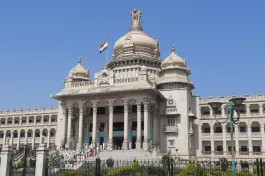In Waiting for the People, Nazmul Sultan reads over a century of Indian anticolonial thought in an innovative new vein. Instead of dwelling on ideas of the nation, Sultan posits that it is much more productive to focus on anticolonial thinkers’ 1Sultan avoids use of the term “nationalist” in his book, part of his reframing from the nation to the people. I will occasionally retain “nationalist” in this review not as a point of disagreement, but due to the familiarity of the term. conceptions of the people. Were the people in British India one or many? Were they ready for self-government? How did the “backward” nature of the Indian people – and the imperative of developing sovereign authority amongst the people – weaken and strengthen arguments for hastening the end of colonial rule?
Political figures from Rammohun Roy to Bipanchandra Pal to Jawaharlal Nehru shaped their thought about the Indian people in relation to Western justifications for imperialism. These justifications embraced conceptions of democracy, development, and hierarchical understandings of peoplehood. The “starving masses” of India could make a jarring contrast with the sovereign, self-ruling people at the heart of the British Empire.
Sultan makes the case for applying the Indian anticolonial experience to the wider world of democratic theory.
Sultan argues that this contrast would, in the eyes of liberal imperialists and Indian political figures, have clear implications for the “speed” or “time” of India’s trajectory towards self-government. By understanding anticolonial thought through the lens of the people, rather than the nation, we get a far more nuanced sense of the meaning of sovereignty in the Indian context. In particular, Sultan traces the idea of popular sovereignty: how anticolonial leaders saw self-rule as something intrinsically linked to projects of political education and economic advancement.
Waiting for the People is a work of political theory, packing in numerous exciting observations and arguments at rapid-fire pace. “Political theory,” Sultan asserts, “has been one of the last disciplines to reckon with the political thought from the colonial and postcolonial world.” In this sense, Sultan makes the case for applying the Indian anticolonial experience to the wider world of democratic theory. By tracing the idea of development amongst both Indian and liberal imperialist thinkers, Sultan also complements some new and exciting work which has drawn links between 20th century conceptions of development and ideas broached in the subcontinent in the late 19th century.
Does theory run the risk of ignoring or simplifying specific historical contexts?
The close application of history to political theory, however, invites a number of questions and concerns. How does the historical record both buoy and undercut theoretical claims? Does theory run the risk of ignoring or simplifying specific historical contexts? As someone who strongly believes in the imperative of rigorous archival research, I must admit that I am instinctively suspicious of grand theories and overly theoretical works. In order to properly assess Sultan’s arguments, I believe that it is necessary to keep in mind three cardinal lessons about history imparted from the archives:
Lesson One: opinions expressed in an individual’s published writings can oftentimes be at sharp variance with what is expressed in private correspondence. This is particularly the case in the colonial context: Indian nationalists were acutely aware that one slight misstep in their published books, pamphlets, and newspapers could excite the cry of sedition from imperial authorities. Private correspondence also illuminates individuals’ careers and ideas in a way that is simply not possible from scanning published writings. We learn about their private opinions, their hopes and fears, and their activities which were shielded from the public eye.
Lesson Two: what was jotted down in private correspondence cannot ever adequately recover what was conveyed in private conversation. Here, it is particularly important to put in the time and thoroughly scan the records for hints of closely guarded views and activities: patience and a willingness to “turn every page,” as Robert Caro reminds us, can yield extraordinary insights.
Lesson Three: people change. So do their ideas. Talking about “Gandhian thought” or “Nehruvian thought” is a little misleading. Which Gandhi? Which Nehru? From my own study of Dadabhai Naoroji, I was surprised to see how quickly his views – and the views of many of his correspondents – underwent radical, transformative change.
Making haste slowly
With these lessons in mind, we can return to Sultan’s book. His treatment of early nationalists – arguably the most misunderstood generation of anticolonial leaders – is much more sympathetic than earlier accounts of competing elites and timid mendicants. He argues that, due to their misgivings about the current fitness of the Indian people, 19th century leaders held aloft the goal of self-government but pushed it into the distant, unknowable future, achievable after a long apprenticeship where the people could become worthy of the political sovereignty invested in them.
Early nationalists could strongly defend the fitness of non-elites for self-government [… and] more routinely expressed disappointment in the abilities of their fellow political elite.
Invoking Lessons One and Two, I find these characterisations a little problematic. First, early nationalists could strongly defend the fitness of non-elites for self-government. As early as 1867, W. C. Bonnerjee praised the “remarkable degree of intelligence” of “the people” in India while condemning the idea that self-government was an avenue only open to Europeans. Allan Octavian Hume made it a point to induct raiyats – cultivators – into the Indian National Congress and involve them in its inner workings, laying preliminary foundations for mass political involvement. (Hume often boasted that the Congress’ electorate was bigger than that of the British Parliament). In private correspondence, figures such as Hume, Naoroji, William Wedderburn, and Gopal Krishna Gokhale more routinely expressed disappointment in the abilities of their fellow political elites rather than the supposed unfitness of the Indian “masses.”
Second, one should not confuse nationalists’ concerns about the people’s fitness with their understandings of the external circumstances which caused their poverty and ignorance. It is true that, in their publications, figures like Naoroji and Surendranath Banerjea used somewhat throwaway terms like the “starving masses” and “dumb millions.” But a close reading of surviving private correspondence lays bare the catalysts of early Indian nationalism: abject horror at the mass death taking place during famines and indignation at how Indian human capital was wasting away due to a lack of educational, professional, and administrative opportunities. The Indian people were not simply starving and dumb; rather, they were subject to terrible misrule.
How long must we wait? – was not just dependent on Indians’ supposed need for preparation and training. One must take into account the intransigence of colonial authorities.
These realisations, if anything, made many early nationalists conscious of the necessity of speed rather than, as Sultan asserts, political gradualism. Self-government was not always some distant, fuzzy goal: many late-nineteenth-century politicians developed detailed roadmaps and timelines for its achievement.
The question of time – how long must we wait? – was not just dependent on Indians’ supposed need for preparation and training. One must take into account the intransigence of colonial authorities: anticolonial leaders knew all too well that they would stall, prevaricate, and obstruct. “They [British officials] are forging stronger iron chains for us so that we may not be able to unfetter ourselves for the next century to come,” Dinsha Wacha wrote to Naoroji in 1887. His anxious desperation betrayed a sense of urgency and haste.
To overcome these obstacles, some Indian politicians worked with allies in Britain, such as Charles Bradlaugh, to jumpstart constitutional change through Parliament. Others, like Naoroji, dispatched to Henry Campbell-Bannerman, the British prime minister, a multistep plan for transferring authority to Indians. In public, they foreswore ambitious political goals. In private, they laid their very foundations.
In a Victorian-era version of a “hot mic” moment (cue to Lesson Two), we can find Hume cryptically alluding to the goal of home rule in early 1887 in a private note to Naoroji. This was just a few months after he publicly disavowed in a newspaper interview that the Congress wanted anything like a representative parliament. (The language of home rule illustrates how closely early nationalists crafted their program in relation to the Irish struggle, something which no work on Indian nationalism or anticolonial thought can overlook).
Changing ideas
Sultan’s account moves on from early anticolonial figures to consider the extremists of the early twentieth century, figures like Bal Gangadhar Tilak and Aurobindo Ghose; Mohandas K. Gandhi; federalist thinkers; Jawaharlal Nehru; and M. A. Jinnah and B. R. Ambedkar, who launched the most consequential attacks against the idea of the oneness of the Indian people.
Gandhi’s catechism broke away from considerations of the fitness of the people by positing authority in the individual.
Turning to Gandhi, Sultan largely focusses on Hind Swaraj. His reading of Hind Swaraj yields unique and valuable insights: rather than a Luddite text or a moral escape from politics, Gandhi’s catechism broke away from considerations of the fitness of the people by positing authority in the individual. “The nation played no central role in his theory of action,” Sultan writes about Gandhi. “Rather, the source of action […] was vested in the individual, not in collectivities such as the people or the nation.”
Invoking Lesson Three, one can find clear limits to this assertion. Gandhi – whose collected works, which are hardly comprehensive, span a hundred volumes – changed, revised, and modified his views with startling rapidity, seeing little problem with any resulting inconsistencies. Hind Swaraj needs to be understood as a product of its time, when Gandhi was building upon his experiences waging satyagraha in distant South Africa. (It was also heavily influenced by Gandhi’s interactions with revolutionary figures in the diaspora).
'Hind Swaraj' needs to be understood as a product of its time, when Gandhi was building upon his experiences waging satyagraha in distant South Africa.
The rest of Gandhi’s writings and correspondence can tell starkly different stories. Once he returned to India, Gandhi was, at umpteen moments, forced to confront ideas like the nation, the people, and questions of majorities and minorities – and thereby reconsider his ideas about the individual versus the collective.
In this vein, it is difficult to agree with Sultan’s assertion that Gandhi’s vision of swaraj “entailed a rejection of appealing to the people.” During the Non-Cooperation Movement, for example, Gandhi developed rather nuanced ideas of Indian peoplehood, deploying these ideas to assuage worries about minority rights once swaraj was achieved. His ideas about the Indian people – and the Indian nation – underwent another radical transformation in the 1940s when, as Kumkum Sangari shows, he approached Nehruvian understandings of secularism, crafting a sophisticated “discourse of citizenship” based on “his evolving multireligious pluralism.”
Grand theories and messy histories
In many ways, Sultan’s book follows in the footsteps of another work of political theory, Partha Chatterjee’s Nationalist Thought in the Colonial World. While full of brilliant insights into anticolonial nationalism, Chatterjee’s work caused me significant frustration when I first encountered it in graduate school. How was it possible to distil Indian nationalist thought into three discrete “moments” represented by three individuals – Bankimchandra Chatterjee, Gandhi, and Nehru? And how was it possible to make sweeping claims based only on readings of selected published works; for example, limiting Gandhi’s myriad contributions to a study of Hind Swaraj? No amount of then-fashionable theoretical gloss can compensate for these methodological choices, choices which fly in the face of those three lessons from the archives which I have outlined above.
To phrase my concerns differently: too much Gramsci, too little granular detail.
Thankfully, Waiting for the People is based on much more rigorous and comprehensive archival research than Chatterjee’s book. Sultan unearths some novel finds, such as a “proxy encounter” between Rammohun Roy and James Mill, and illuminates the political thought of forgotten figures such as Dakshinaranjan Mukherjee, who excoriated the nature of Company rule in 1843.
“History is not a factory for the manufacture of Grand Theory,” E. P. Thompson once warned.
Nevertheless, one must be careful with grand theory, even if it is constructed upon a sturdier archival foundation. The archival record demonstrates the difficulties of distilling myriad twists, turns, and contradictions in historical thought and action into attractively simple theoretical frameworks. And, while it might be at odds with academic fashion, there has been a long tradition of unease about how theory poorly substitutes for the empirical rigour of historical methods. “History is not a factory for the manufacture of Grand Theory,” E. P. Thompson once warned.
Scholars such as Quentin Skinner have rightly emphasised the importance of historical context while evaluating ideas and texts, something which is even more important when considering politics in the colonial world. Unlike many of their contemporaries in the West, the Indian anticolonial thinkers identified in Waiting for the People did not have the luxury of quiet scholarly contemplation. They were, above all, political actors who built up institutions and movements with concrete political ends, despite deeply unfavourable odds and conditions. Theirs was a world primarily of action rather than thought and theory. 2This is something which, I believe, needs to be better appreciated by practitioners of intellectual history who study colonial political figures. They knew that the fate of millions rested upon their efforts and that the personal cost of failure could be jail or exile. This influenced not only the trajectories of their political thought, but also how and when they revealed the cards they held so closely to their chests.
Indian anticolonial thinkers identified in 'Waiting for the People' did not have the luxury of quiet scholarly contemplation. They were, above all, political actors who built up institutions and movements with concrete political ends.
By applying lessons from the archive to Sultan’s work, I do not mean to dramatically dim my praise for a book which brims with sharp insights and important scholarly contributions. I simply want to add a note of caution about extracting grand theory from the messy, complex record of history and, more fundamentally, register the importance of historical context and nuance.
Development and democracy
In this sense, Sultan’s account of the 1930s and 1940s – when the recognised immediacy of swaraj completely changed the nature of the anticolonial struggle and what was possible to do and say – is more convincing. Nehru is not simply seen as the prophet of technocratic salvation, but rather as someone who made the need for development the very reason for investing sovereignty in the people (It is important to remember here that Nehru was hardly alone in being bitten by the planning bug: as Nikhil Menon’s work shows, a range of Indian political and economic figures thought about planning and development in relation to global experiments).
[On] Jinnah’s and Ambedkar’s critiques of a unified Indian people, Sultan deftly notes that there was a developmentalist thrust behind their splintering of the Indian people.
A new sense of immediacy “had the paradoxical effect of accentuating the fault lines of the anticolonial movement,” prompting Jinnah’s and Ambedkar’s critiques of a unified Indian people. Sultan deftly notes that there was a developmentalist thrust behind their splintering of the Indian people: Jinnah, for example, believed that a separate Pakistan could rectify the educational and economic backwardness of Indian Muslims.
Sultan’s shift in focus from the nation to the people, therefore, provides intellectual ballast to economic and developmentalist interpretations of the messy endgame of the Raj. This shift in focus also clarifies other aspects of the anticolonial struggle in India: for example, why the diaspora played such an outsized role in the Indian political imagination (as it continues to do so today).
The specific link Sultan crafts between development and democracy in the postcolonial world has obvious resonance in our time. The promise of development – distinct from its actual delivery – continues to shape the relationship between the people and the government: witness the magic aura of the slogan of vikas in India or the continued resonance of the Beijing Consensus elsewhere. In this sense, Waiting for the People offers some provocative takes not only on colonial and postcolonial thought, but also on early 21st century dilemmas about the people, progress, and power.
Dinyar Patel is an associate professor of history at S.P. Jain Institute of Management and Research in Mumbai and an associate at the Mittal South Asia Institute at Harvard University. He is the author of Naoroji: Pioneer of Indian Nationalism, which won the 2021 Kamaladevi Chattopadhyay NIF Book Prize.









